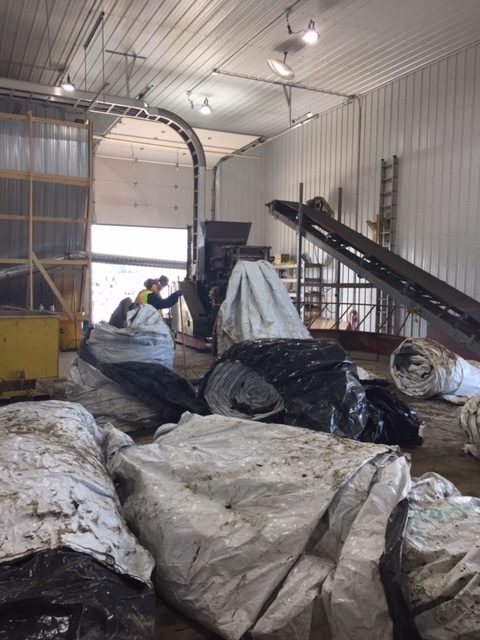AB Direct - Steers
Rail: ---
AB Direct - Heifers
Rail: ---
US Trade- Steers
Rail: ---
US Trade - Heifers
Rail: ---
Canadian Dollar
0.04

How ag plastics recycling works in Alberta – challenges and opportunities
Cleanfarms and the Alberta Agricultural Plastics Recycling Group (APRG) are publishing a series of information articles for Alberta farmers to develop a shared understanding of the importance of used agricultural plastics resource management.
Every farmer in Alberta who uses tools such as plastic grain bags, agricultural baler twine and bale wrap faces the same obstacles for disposal once these products have served their purpose. Options are slim, and depending on where farmers are located, may include only disposal at the local landfill or behind the farm gate.
Some farmers are close to locations where Cleanfarms operates pilot projects to test and identify best practices in collecting used ag plastic such as specifying that materials be prepared properly to facilitate efficient transportation and processing for recycling. One such pilot is led by the multi-stakeholder Agricultural Plastics Recycling Group (APRG) through funds granted by the Government of Alberta and administered by Alberta Beef Producers. While the intention is to develop a province-wide program, collection sites for these materials are not yet available everywhere.
One exception is Cleanfarms’ recycling program for empty pesticide and fertilizer containers that was launched in Alberta more than 30 years ago and that still operates across the province as well as nationally. In the last few years, Cleanfarms has added a recycling program for non-deposit drums and totes up to 1000L, too. Return rates of these small and large containers are increasing year over year.
Can the ag sector achieve zero plastic waste on the farm?
Nearly everyone agrees that recycling these plastics is a better practice than landfilling or on-farm disposal. The environmental benefits and farm sustainability for future generations are reason enough. But there is also recognition that finding a way to recover natural resources and use them again and again is better than the one-way street of use and discard. To realize the environmental good that resource recovery and recycling promises, farmers find that they have to invest a little more in the process. For example, grain bags need to be shaken free of residue grain and critters, and then tightly machine rolled for transportation. Similarly, it’s important to shake excessive dirt, sand, debris and snow from both grain bags and twine. These steps are required to ensure the processing facilities can utilize used plastics for recycling.

Recycling know-how improves every time Cleanfarms conducts a pilot because each project is designed to figure out what makes a successful recycling program and what will cause it to falter.
It has become clear, for instance, that after use, each type of material has to be managed individually because they have different plastic properties and go to separate final recycling destinations.
Grain bags are rolled; twine is placed in Cleanfarms recycling bags. Cleaned up, sorted materials can be recycled. Excessively dirty and co-mingled materials can’t. It is as simple as that.
Once farmers take used materials to recycling collection sites, Cleanfarms arranges for transport to recycling end-markets located throughout Canada and the USA. Two such facilities for these plastics are situated here in Alberta: Crowfoot Plastics is near Hussar and PolyAg Recycling Inc. is in Bashaw.
Depending on the type of plastic, the recycled material is used to make new products such as agricultural fence posts, car parts, dimensional plastic lumber, plastic pallets, and planter pots for greenhouses to name a few.
Challenges of Recycling
Though recycling ag plastics continues to expand and improve, it still faces challenges that include:
- Compacting plastic to bales for efficient and cost effective transportation (the largest challenge).
- Getting clean used materials that are free of excessive dirt, sand, debris, ice and snow.
- Maintaining a steady collection of these plastics to ensure the recyclers have sufficient feedstock.
- Encouraging the use of recycled content in the manufacture of new products, which drives demand for used materials, lowering the cost of using recycled vs. virgin content.
- Encouraging procurement that specifies recycled content to fuel and stabilize the value chain.
- Building resilience into the system to withstand fluctuating prices for recycled commodities.
- And finally, to dispel an old myth, recycling is not free. Like other economic processes, it costs money to operate.
It’s true that recycling is a complex business but it is equally true that we are closer now to forging the pathway to an economically feasible and operationally efficient ag plastic resource recovery system. Alberta farmers can be proud of how they have helped develop better systems by participating in Cleanfarms’ existing programs like the annual collection of small jugs and large totes and drums, the program to collect and properly manage for disposal unwanted and old pesticides and animal health medications, as well as the various pilots. Plus, they can look forward to the near future when the grain bag and twine recycling program will serve Alberta farmers province-wide.
Subscribe to the ‘Ag Forward’ Newsletter
Cleanfarms is operating a three-year pilot project for grain bag and baler twine recycling in Alberta. The project is led by the multi-stakeholder APRG. Funds were granted by the Government of Alberta and are being administered by Alberta Beef Producers. Check out the details: Recycle It!
